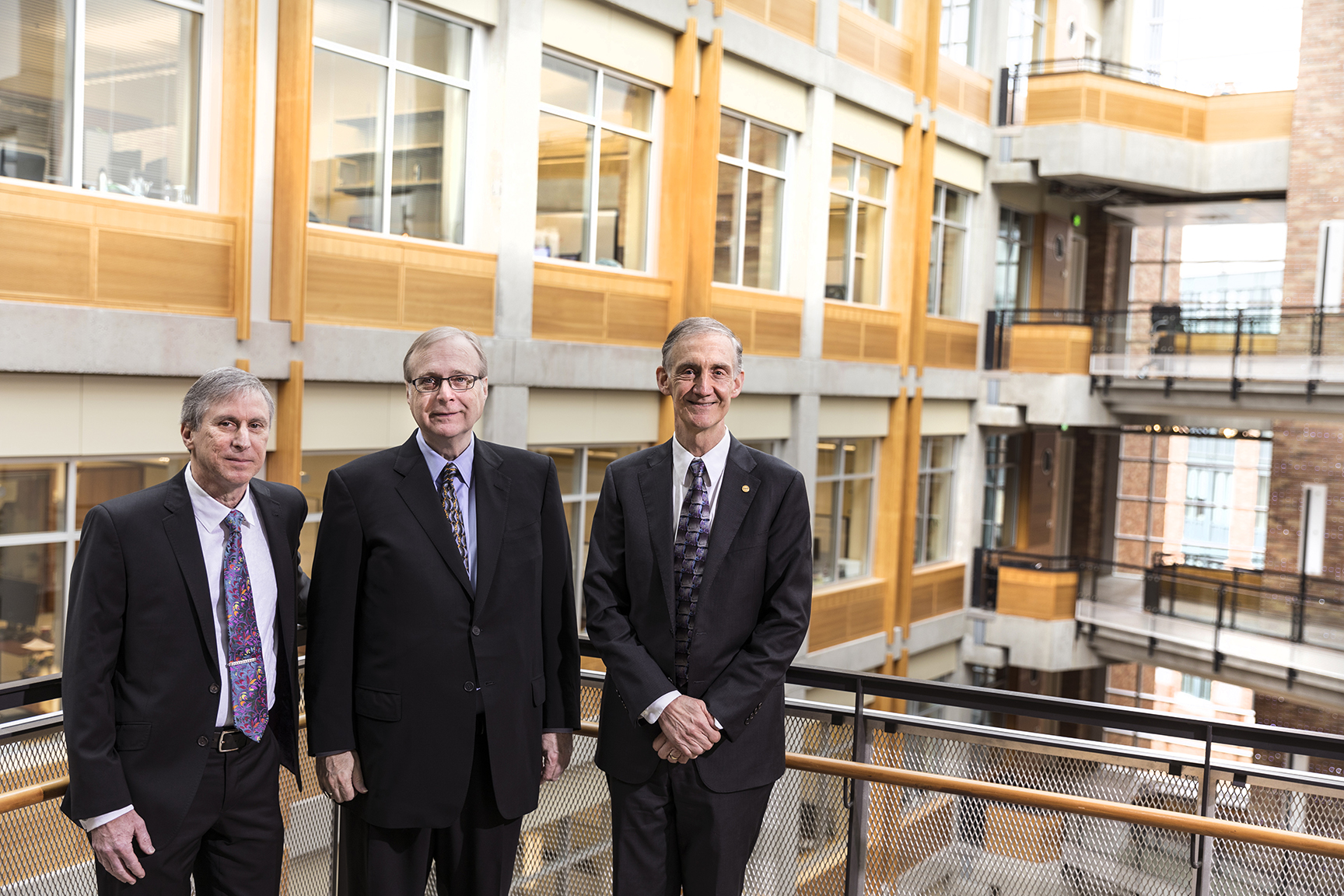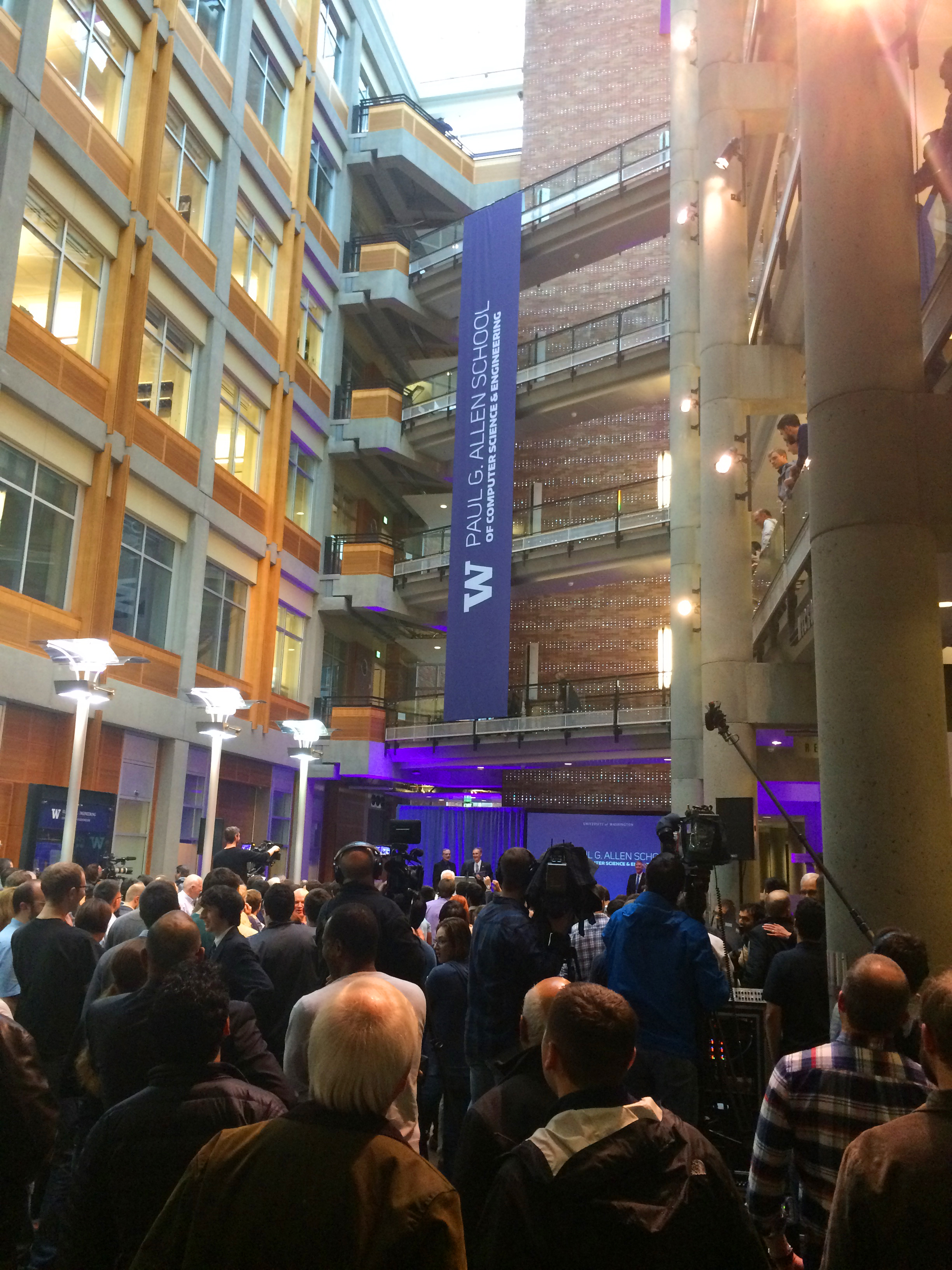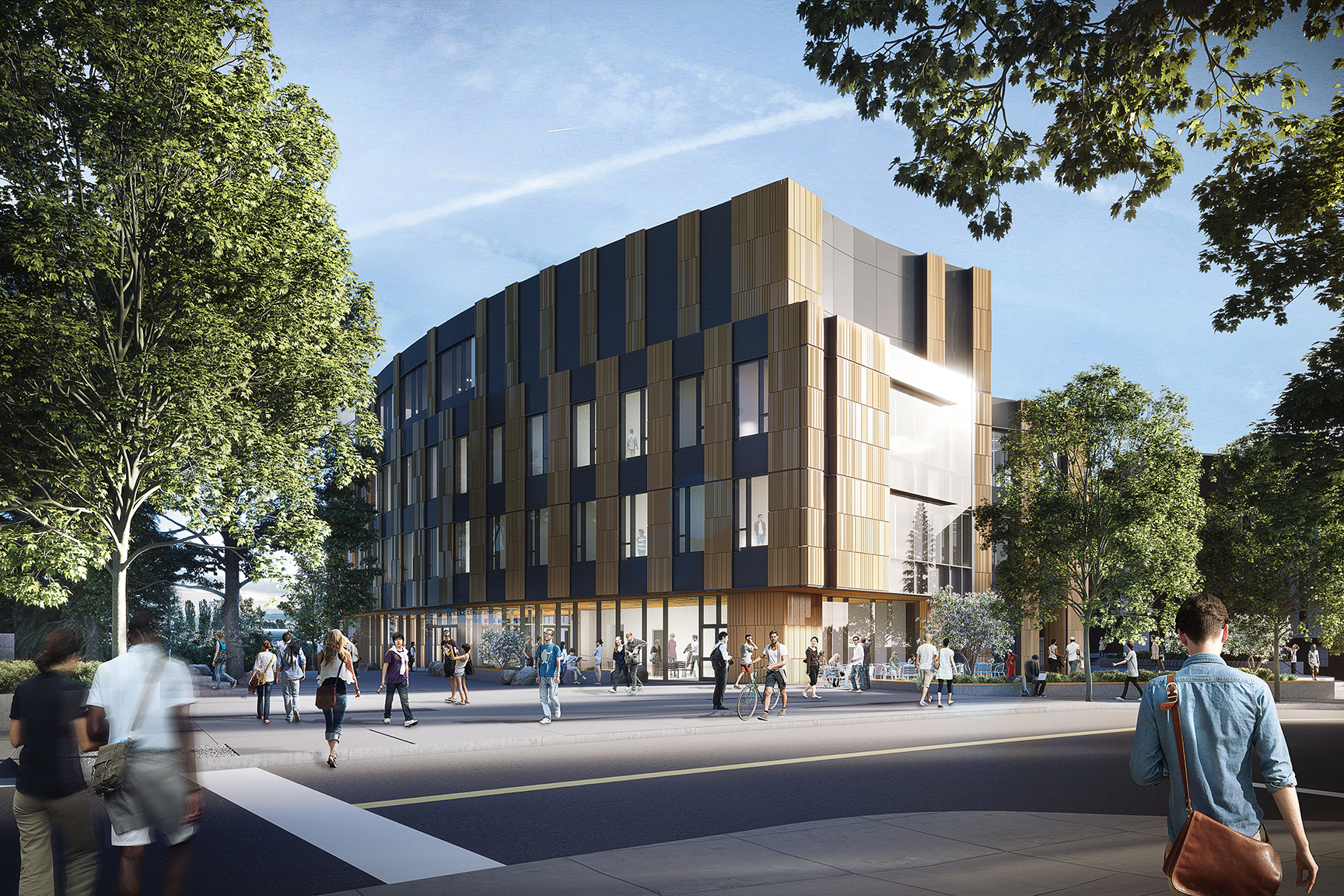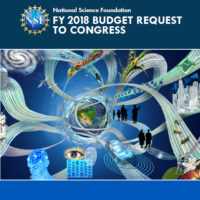Maximizing Opportunity and Building Capacity: Computer Science and Engineering at the University of Washington

The authors, Hank Levy (left) and Ed Lazowska (right), with Paul Allen (center) in the building that bears his name. Credit: Mark Stone/University of Washington.
By Ed Lazowska, Bill & Melinda Gates Chair, and Hank Levy, Director and Wissner-Slivka Chair,
Paul G. Allen School of Computer Science & Engineering, University of Washington
Computer science has emerged as a cornerstone of the modern university and the modern world. The impact of computing innovation touches nearly every field—and has transformed entire industries beyond recognition from what they were 20, 10, or, in some cases, just a few years ago. Because of this, computer science has come to be viewed as one of the greatest engines of opportunity, whether for students seeking a degree with great job prospects (and even greater potential for real-world impact), or for the economic benefits that research activity and companies in this sector bring to a region. As students at Yale University wrote two years ago, “the best universities in the world are now judged by the quality of their computer science departments.”
This article describes strategies we have employed at the University of Washington to increase the prominence and impact of our program. In the past few years we have been elevated from a department to the Paul G. Allen School of Computer Science & Engineering, we have begun construction on a second building that will double our space, and we have received legislative investments that will double our enrollment while preserving our ability to closely mentor students. While we have some important advantages (principal among them Seattle’s emergence as a leading center of technology in multiple sectors) and some particular circumstances (such as our role as a public university, dependent upon legislative support and bearing regional responsibilities), we believe that many of these strategies will be usable by others.
Computer Science: From Smaller, Faster, Cheaper to Tackling Big Societal Challenges
Nearly a decade ago we decided to embrace the view that success in computer science in the next 50 years will be determined by our impact on societal challenges such as education, health care, energy efficiency, and transportation, and to seek a first-mover advantage in this space. This perspective has paid off in many ways. It’s a differentiator. It’s a stimulus for collaborations across the university and the region. It attracts diverse students. And it has broad appeal with external supporters such as citizens, civic leaders, prospective donors, and state legislators.
There is nothing magical about this particular view of the future. What is magical, though, is having some well-articulated view of the future that people can relate to and that can be used to guide investments.

On March 9th, faculty, students, alumni, and friends in the local community gathered to celebrate the creation of the Paul G. Allen School of Computer Science & Engineering at the University of Washington. Credit: Kristin Osborne/Paul G. Allen School of Computer Science & Engineering.
Understanding Our True Value Proposition
We can – and we do! – talk about the importance of our research and about our value to our regional economy and to society in terms of the innovations we generate and the companies we spin out. But we know that for the vast majority of supporters, what they value most are the people we educate. For our elected leaders in the state capital, this is because we are a unit of the state’s flagship public university and we educate Washington’s students for Washington’s leading-edge jobs. For employers, it’s because our graduates power their companies. For prospective donors, it’s often because they see how computing can change the world and recognize the role of well prepared, highly creative professionals in advancing that impact.
Recognizing that we are valued, first and foremost, for our graduates has enabled us to craft a compelling story.
Building a Base of External Support
We cultivate relationships with legislators, with trade and advocacy organizations, with tech industry leaders, and with members of the local media. We provide data on student demand, workforce demand, and the economic opportunity for our region, and we share stories of the impact our faculty, students, and alumni are having in the real world. We cultivate champions who are only too happy to deliver this message on our behalf, because they understand what’s at stake. As an example, it is now well understood in our region that the workforce gap (the gap between degrees granted and jobs available) in computing is four times as great as the workforce gap in all other fields of engineering combined; that our program is by far the preferred source of graduates for leading tech employers in our region; and that computer science is the first-choice major of more incoming freshmen than any other field.
Taking our message to the broader community and getting everyone to sing from the same song sheet has been critical to securing the support of decision-makers on and off the campus.
Engaging Alumni Early and Often
We look for ways to make it easy for recent graduates to “give back” in the form of time, money, or both. One of the easiest mechanisms for alumni to amplify their support is through a corporate match. Each year, we identify our giving priorities and reach out to a handful of engaged alumni at companies with matching programs. They then lead the charge internally during their giving campaigns. We also set up our own matching program, backed by a $1 million gift from a longtime friend and donor interested in helping the younger generation engage philanthropically with their alma mater. Finally, we foster a virtuous cycle of mentorship by enlisting our alumni’s help in student résumé workshops, mock technical interviews, and guest lectures.
Everyone enjoys social events like regional “all-calls” and company happy hours, but the opportunity to give back in a meaningful way is what builds enduring connections with our alumni community.
Substantive Relationships as the Heart of Stewardship
While alumni support is critical, many of our biggest donors and supporters are not former students. They are members of the community who understand our role in advancing discovery, solving real-world problems, and, most importantly, producing first-rate graduates. And many of those who are repeat donors became so through stewardship driven by faculty and students, not through the traditional development organization. Events and meetings are useful, but nothing captures people’s imaginations or instills a sense of buy-in like the opportunity to spend quality time with our students and faculty through customized lab tours, hands-on demos, one-on-one interactions, and substantive personal relationships.
By making the human connection a centerpiece of our stewardship efforts, we have turned building donors into endowment donors, and modest scholarship donors into major benefactors.

The Allen School assembled public and private support to construct a second building that will provide the space to double enrollment in response to skyrocketing student and employer demand. Credit: LMN Architects.
Community Outreach and Inclusion
We have created a number of programs to engage members of the community. Many of these activities also help to create an environment that supports diversity and inclusiveness. Through our K-12 outreach program, DawgBytes, we organize summer day camps for K-12 students to explore computer science – which includes providing scholarships to students from low-income families – and host open houses and workshops for students, teachers, and parents throughout the year. We also emphasize accessibility through research and educational programs for people who are blind, deaf, or living with severe motor impairments. To make sure we walk the talk internally, we created a school diversity committee made up of faculty, staff, and students, and appointed a director of diversity and outreach, backed by philanthropic support, to coordinate our internal and external-facing programs.
These efforts are valuable in their own right, but it turns out they are also attractive to donors and our friends in industry.
Under-Promise and Over-Deliver
The people you ask for support will view past results as an indicator of future behavior, so you can’t go wrong if you under-promise and over-deliver. When Paul Allen made his first significant investment in our program – the naming gift for the Paul G. Allen Center for Computer Science & Engineering – we used it as a springboard for tripling our research activity and strengthening our expertise in emerging areas of the field; now we have become the Paul G. Allen School of Computer Science & Engineering. When the state legislature directed additional funds to our program to increase capacity, we immediately implemented that directive; now we have received multiple years of funding for growth. Our “zero-BS” relationships with Microsoft, Amazon, Google, Zillow, the state, and many individual supporters have resulted in the funding for our second building. Microsoft, in particular, has been a truly extraordinary supporter through its direct support, and through its influence with others, such as University of Washington leadership, civic organizations, other companies, and the legislature.
Making a habit out of not only meeting but exceeding people’s expectations is one of the reasons that we have been so successful at securing support for new initiatives.
In Summary
None of this is rocket science. Establish a vision. Understand your value proposition. Build a base of support. Engage your alums. Take responsibility for building substantive relationships. Reach out and be inclusive. Do what you say you’re going to do, and more.
At the March 9 celebration of the establishment of the Paul G. Allen School of Computer Science & Engineering, Mr. Allen said that we are entering “a new golden age of innovation in computer science.” We all need to work to ensure that the role of computer science and the role of our programs are appreciated. It will pay off for each of us, for the entire field, and for the world.
About the Authors
Ed Lazowska is the Bill & Melinda Gates Chair in the Paul G. Allen School of Computer Science & Engineering at the University of Washington, where he also serves as director of the University of Washington eScience Institute. His research and teaching concern the design, implementation, and analysis of high-performance computing systems, and the techniques and technologies of data-intensive discovery. He is a member of the National Academy of Engineering and a fellow of the American Academy of Arts & Sciences. Ed is a former chair of the CRA board of directors and the inaugural chair of the Computing Community Consortium.
Hank Levy is the director of the Paul G. Allen School and Wissner-Slivka Chair in Computer Science & Engineering at the University of Washington. He is the author of two books and more than 100 papers on computer systems design and computer architecture, including more than a dozen best paper and test of time awards. Hank is a member of the National Academy of Engineering and a fellow of the Association for Computing Machinery and the Institute for Electrical and Electronics Engineers.








